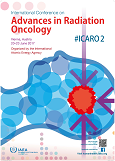Speaker
Ernest Okonkwo
(Ortenau Klinikum Offenburg-Gengenbach)
Description
1. Introduction:
The 2014 World Health Organization (WHO) Cancer Report highlights major global cancer disparities, with over 60% of 14 million new cases and 70% of 8.2 million deaths per year occurring in low and middle-income countries (LMIC). These major disparities in cancer deaths are in part a reflection of poignant underlying disparities in Radiation Oncology services. For example, radiotherapy, which is needed in the treatment of over 50% of cancer patient, is not available in 31 of Africa’s 54 countries. These disparities are exacerbated by the devastating effects of African brain drain, the emigration of African Health Care Professionals to Europe, Asia and North America. We describe efforts about a growing movement of these African Diaspora Healthcare Professionals to turn the brain drain into gain in reducing the global disparities in Radiation Oncology care, research and education using advanced information and communication technologies (ICTs).
2. Method:
We reviewed the growing number of global oncology publications, conferences, symposia, organizations, and global health activities lead by Africans in Diaspora (AiD) over the past 5 years to assess the outcomes and emerging consensus on how ICTs can be employed by the AiD for Global Radiation Oncology.
3. Results:
There has been an upsurge of activity by the AiD in Global Radiation Oncology towards establishment of a virtual Harambee platform for telemedicine, online learning and e-research involving AiD in Europe and North America united against cancer. This effort is being lead in Europe by MEPHIDA (Medical Physicists in Diaspora for Africa) and in North America by the Harvard Global Health Catalyst bringing the AiD and ICTs together. With launch in April 2017, the ICT-powered Harambee platform integrates: 1) telemedicine activities: remote treatment planning and quality assurance support; second opinion; and support in the setting up of new radiotherapy facilities in Africa 2) Education and training in Global Radiation Oncology certificate programs in partnership with the African Organization for Research and Education in Cancer (AORTIC) 3) Crowdfunded research with AiD mentors on low cost technologies for radiation oncology and imaging.
4. Conclusion:
Africans in Diaspora are coming together across countries and continents to connect the values of community belonging (Harambee) with technological advancement to create a system where every African woman, girl, man, and boy can have access to radiation oncology services. The virtual Harambee provides an unprecedented growing movement to turn brain drain to major gain, reducing the disparities in radiation oncology in Africa.
| Institution | Ortenau Klinikum Offenburg-Gengenbach |
|---|---|
| Country | Germany |
Primary author
Ernest Okonkwo
(Ortenau Klinikum Offenburg)
Co-authors
Lydia Asana
(African Renaissance Ambassador Corp, Orlando, USA)
Rebecca Bücker
(Radiotherapy Department, klinikum-lippe, Germany)
Richard Samba
(National Radiation Protection Agency Yaounde, Cameroon)
Wilfred Ngwa
(Radiation Oncology, Harvard University)

